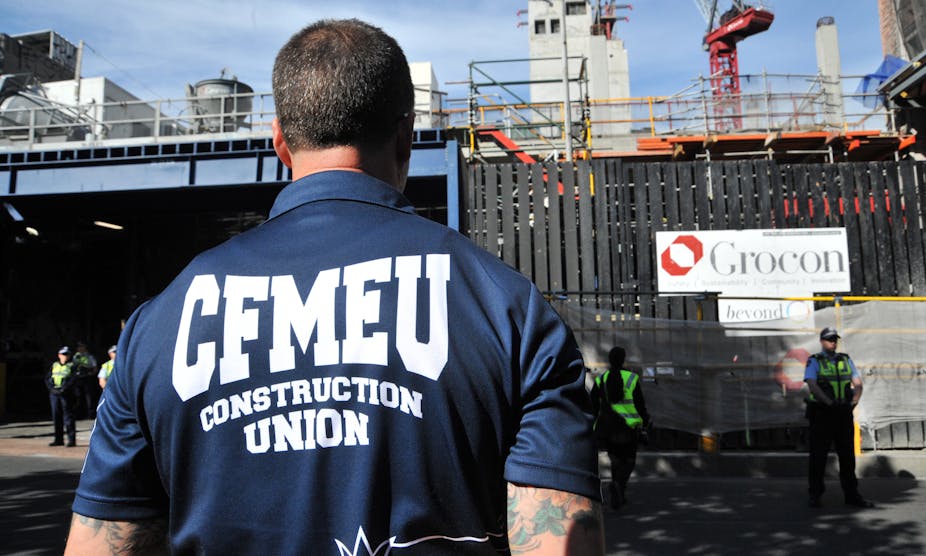Australia’s construction union will not back down on militancy in the face of tougher laws surrounding construction sites, according to controversial union boss Joe McDonald.
The Abbott government last week flagged the introduction of legislation to re-establish the Australian Building and Construction Commission, in a bid to increase productivity and reduce union militancy.
The Australian construction industry has the distinction of having had two Royal Commissions into its practices in ten years. The first was headed by Roger Gyles in NSW, the second by Terence Cole for the Howard Government.
Both inquiries looked at the effect of the Construction Forestry Mining and Energy Union (CFMEU) on the industry’s productivity and efficiency. They found widespread disregard for the rule of law in industrial relations by both the union and contractors in the industry, among other issues.
After the Cole Commission recommended widespread changes to the industry’s IR laws, legislation establishing the Australian Building and Construction Commission (ABCC) as a statutory authority to monitor workplace relations was passed in 2005.
The ABCC was deeply opposed by the unions and in July 2012 was replaced by the Gillard government by the Fair Work Building and Construction Inspectorate, a body with reduced scope and powers.
In the last election campaign, the Coalition announced a policy to restore the ABCC within 100 days if elected, and intends to introduce the legislation necessary in the first sitting week of Parliament.
This is one of a number of measures the Abbott government is reported to be considering to address union militancy in the construction industry.
It’s also the only major IR reform currently expected from the government in its first term, despite considerable pressure by a number of industry bodies for a more wide-ranging reform of IR.
The good behaviour commission
There are two arguments for restoration of the ABCC. First is the need for an industry specific watchdog to monitor illegal behaviour of union representatives and officials and, if and when necessary, to intervene in disputes.
The construction industry has lagged other industries in productivity growth for several decades, and some of this is attributed to union opposition to workplace reforms that would improve efficiency.
The number of days lost in construction over the past five years has averaged around 20% of the total for all industries, although there is a wide variation in the number of days per quarter due to industrial disputes in some.
It’s these spikes in days lost – particularly the big increase in days lost to industrial disputes in Victoria in the second half of 2012 – that has attracted the attention of large contractors and the government.
On one hand the rationale for restoring the ABCC is not strong, based on union unrest and strikes in the industry as a whole. After July 2012 there was a significant increase in days lost in the September quarter, when disputes in Melbourne and Brisbane boosted the numbers.
But the following three quarters have not seen unusual or particularly high levels of days lost in the industry, as recorded by the ABS. The view of the employer and contractor associations that days lost “exploded” under the Labor Government is half true, given there was an increase in days lost after 2007, but the disputes have tended to be concentrated on specific, large projects not across the industry as a whole.
On the other hand, the construction industry has always tended to have more days lost per thousand employees than some other industries, although only a fraction of the level in the coal industry (the industry with most days lost in Australia). And since the 2012 spike, this measure has come down to the overall industry average, and has been reasonably steady.
Clamping down to raise productivity?

While the CFMEU has a reputation for militancy and a propensity for industrial action, and it has always had some excessively combative officials, it is in an industry where many employers have shown little regard for issues such as safety.
The other argument for the ABCC is based on the potential for improving construction industry productivity by reducing the CFMEU’s ability to reduce on-site efficiency for building and construction projects.
This is an even more slippery argument to substantiate. The productivity estimates published by the ABS do not show the industry performing well over the last decade, but it has not done particularly badly either.
Construction industry productivity is very difficult to measure accurately. The data from the ABS covers the entire industry, and is collected for residential and non-residential building, engineering construction and the trades. But the ABS definition is wide enough for it to cover anything from self-employed tradesmen who do repair and maintenance work to the largest national contractors.
Problems with separating the different sectors of the industry make it impossible to see if productivity in the more unionised non-residential building sector is better or worse than in residential building, which is more labour intensive, or engineering construction, which is more capital intensive.
So far the industry has not been prepared to compile good data at a project level in a systematic way. Unpublished research by the Centre for Comparative Construction Research at Bond University tends to show projects across Australia do vary in terms of cost, time and quality, and these variations do add up to identifiable differences between the state capitals.
A more widespread approach to building and construction industry reform would be preferable, because there are issues like procurement practices, regulatory costs, and training and technology to be addressed.
But the CFMEU does itself no favours with its confrontational attitude, and the Abbott government needs to be seen to make a move on IR. This is as much a political issue as an economic one.

